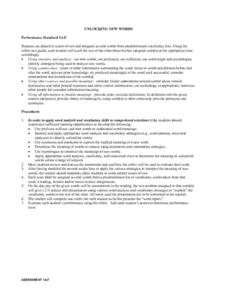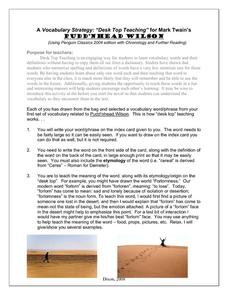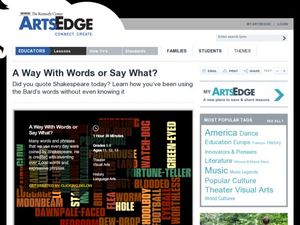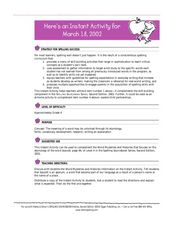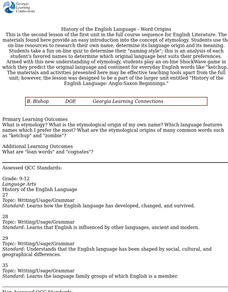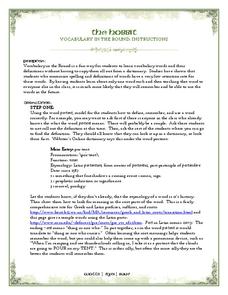Ohio Department of Education
Word Origins
Understanding a word's etymology can really help with decoding and building vocabulary skills. Readers compare and contrast words of similar origins but with different difficulty levels. They focus on prefixes, suffixes, and affixes....
Curated OER
Unlocking New Words: Partner Presentations
Following extensive modeling about how to apply word analysis and vocabulary skills to learn new words, partner teams create brief word presentations to teach new vocabulary to the class. Preselect words from upcoming social studies,...
Curated OER
Mythological Word Origins
No wonder the ship was called the Titanic. An investigation of Norse, Roman, and Greek Mythology provides insight into mythological characters and corresponding words in the English language. A close look at roots, prefixes, and suffixes...
Curated OER
Etymology
Learners dissect and build words from parts like prefixes, base words, suffixes, and inflectional endings. Etymology skills help us find the meanings of words by identifying the different parts that constitute them. Class members use...
Curated OER
Root Words from Greek and Roman Gods' Names
Prepare a stack of index cards with a Greek or Roman god's name on one side and their description on the other. Then, use the worksheet attached to brainstorm as many words that contain the root from each card. Pupils also create their...
Curated OER
Etymology
Young scholars tie together planet names with Greek mythology. Students browse thru a dictionary to see where exactly these names came from and what significance they have. Young scholars explore the origins of some English words.
Curated OER
Confounding Words
Eleventh graders gain understanding of how words in the English language are formed. They assess their own work for sentence clarity and variety of expression. They increase their comprehension and recall.
Curated OER
Spanish in English
What do the words alligator, armadillo, and cockroach all have in common? Each one is an English word with Spanish origins. Introduce young etymologists to the joys of discovering word origins with a lesson that asks them to create a...
Curated OER
Using Word Maps to Expand Vocabulary
Looking for a good instructional activity on dictionary and word definition skills? The instructional activity presented here is for you! In it, learners utilize a worksheet, embedded in the plan, to record a word's...
Curated OER
Etymology Adventures
Students use the internet to research the field of Etymology. Using this information, they create a list of words they were unfamiliar with along with their origin. They complete numerous activities by reading and following directions.
Curated OER
Once Upon a Word
Students explore the derivations and usage of common slang terms. Through internet research and discussion, students consider the Latin and Greek roots of contemporary slang terms. Groups complete an etymology chart documenting their...
Curated OER
Pudd'nhead Wilson: Vocabulary Strategy
Invite your pupils to do the teaching when it comes to the vocabulary in Pudd'nhead Wilson. Each individual is assigned one word to research in depth and teach to classmates, one pupil at a time.
Curated OER
Analyzing Unknown Words
Middle schoolers analyze affixes and how they affect word meaning. In this language arts lesson, students use charts to construct and deconstruct words to find meaning.
Curated OER
Dragonwings: Evaluate Chapters 10-12
As your class finishes the novel Dragonwings, use these culminating projects. A vocabulary list is given for chapters eleven and twelve and either an epitaph or letter activity concludes the book. The final project consists of creating a...
Curated OER
Internet Adventures
Middle schoolers explore where words come from. Every word had a beginning--- a birth. They use the internet and go to a web site given by the teacher to take a quiz on word origins, students are allowed to use dictionaries.
Curated OER
New Year's Etymology and Writing Activity
Students investigate the history and etymology of New Year's Day. They listen to a teacher-led lecture about the background of New Year's Day, design an image of Janus, and write a story in the first person telling what Janus might say...
Curated OER
A Way with Words or Say What?
Students examine Shakespearean language. In this word study lesson plan, students investigate the meaning of words that Shakespeare invented. Students draw and pantomime with the words prior to writing short stories that feature...
Curated OER
Unlocking Word Meanings
Fourth graders investigate eponyms in the English language. In this eponym lesson, 4th graders participate in a teacher led lesson on the definition of an eponym. They complete a worksheet in which they determine which eponym became part...
Curated OER
Persuasive Text: Vocabulary Charades
Learners play charades to act out vocabulary words that have recently been introduced in class. In this vocabulary lesson students may work in groups or in pairs.
Curated OER
History of the English Language - Word Origins
Young scholars use on-line resources to research their own name, determine its language origin and meaning. They take an on-line quiz to determine their "naming-style."
Curated OER
Language Change: The Origins of Names
In small groups or pairs, learners explore the origins of each others' names. An awesome idea, but you'll need to do the initial research to gather your class's names and their origins. Or, consider having each member of your class...
Curated OER
Mississippi Trial, 1955: Vocabulary Strategy (Acquisition)
Readers of Mississippi Trial, 1955 engage in a desktop teaching activity and teach other class members the meaning of a word from Christopher Crowe's novel using an embellished illustration of their word.
Curated OER
Speak Vocabulary Strategy
A scarlet letter “V” stands for a desktop teaching vocabulary activity designed for Speak. Prior to reading Laurie Hales Anderson’s young adult novel, individuals sign up for a word, design a handout that illustrates the word, includes...
Novelinks
The Hobbit: Vocabulary in the Round
Blundering, audacious, obscurest. Class members develop strategies for teaching each other vocabulary words drawn from The Hobbit.

